Professional Skills for Accountants: Management and Training Report
VerifiedAdded on 2020/10/05
|11
|2628
|195
Report
AI Summary
This report provides a comprehensive overview of professional skills essential for accountants. It begins with an evaluation of Henri Fayol's 14 principles of management, assessing their impact on improving managerial skills and organizational goal attainment. The report then delves into systematic training and development programs for a blue-chip finance company, analyzing key processes and training methods to address underperformance. Furthermore, it compares and contrasts ethics with laws, exploring ethical problems faced by managers in business organizations and strategies to overcome them. The study emphasizes the significance of these skills in enhancing operational efficiency and fostering sustainable growth within the accounting and finance sector.

Professional skills for accountants
Paraphrase This Document
Need a fresh take? Get an instant paraphrase of this document with our AI Paraphraser
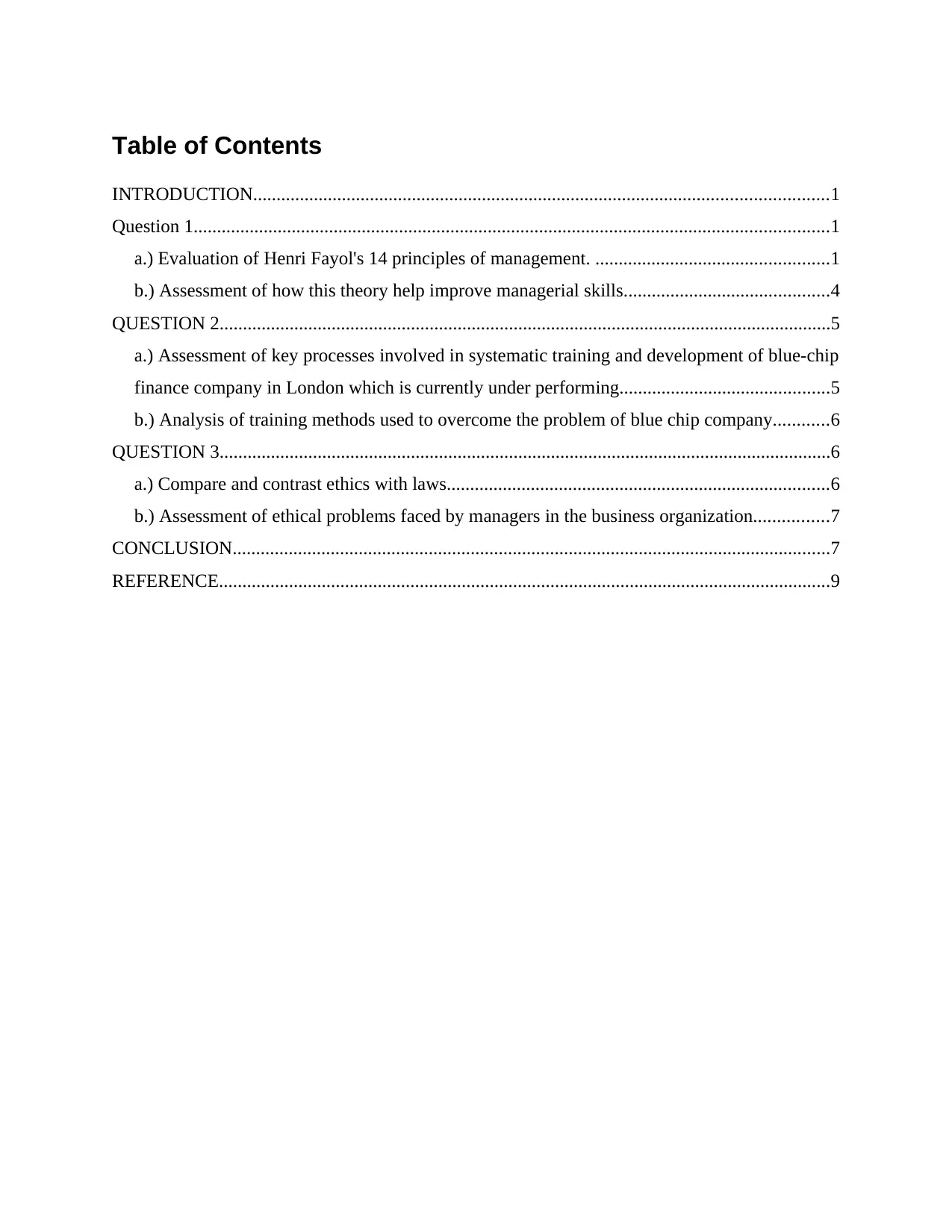
Table of Contents
INTRODUCTION...........................................................................................................................1
Question 1........................................................................................................................................1
a.) Evaluation of Henri Fayol's 14 principles of management. ..................................................1
b.) Assessment of how this theory help improve managerial skills............................................4
QUESTION 2...................................................................................................................................5
a.) Assessment of key processes involved in systematic training and development of blue-chip
finance company in London which is currently under performing.............................................5
b.) Analysis of training methods used to overcome the problem of blue chip company............6
QUESTION 3...................................................................................................................................6
a.) Compare and contrast ethics with laws..................................................................................6
b.) Assessment of ethical problems faced by managers in the business organization................7
CONCLUSION................................................................................................................................7
REFERENCE...................................................................................................................................9
INTRODUCTION...........................................................................................................................1
Question 1........................................................................................................................................1
a.) Evaluation of Henri Fayol's 14 principles of management. ..................................................1
b.) Assessment of how this theory help improve managerial skills............................................4
QUESTION 2...................................................................................................................................5
a.) Assessment of key processes involved in systematic training and development of blue-chip
finance company in London which is currently under performing.............................................5
b.) Analysis of training methods used to overcome the problem of blue chip company............6
QUESTION 3...................................................................................................................................6
a.) Compare and contrast ethics with laws..................................................................................6
b.) Assessment of ethical problems faced by managers in the business organization................7
CONCLUSION................................................................................................................................7
REFERENCE...................................................................................................................................9
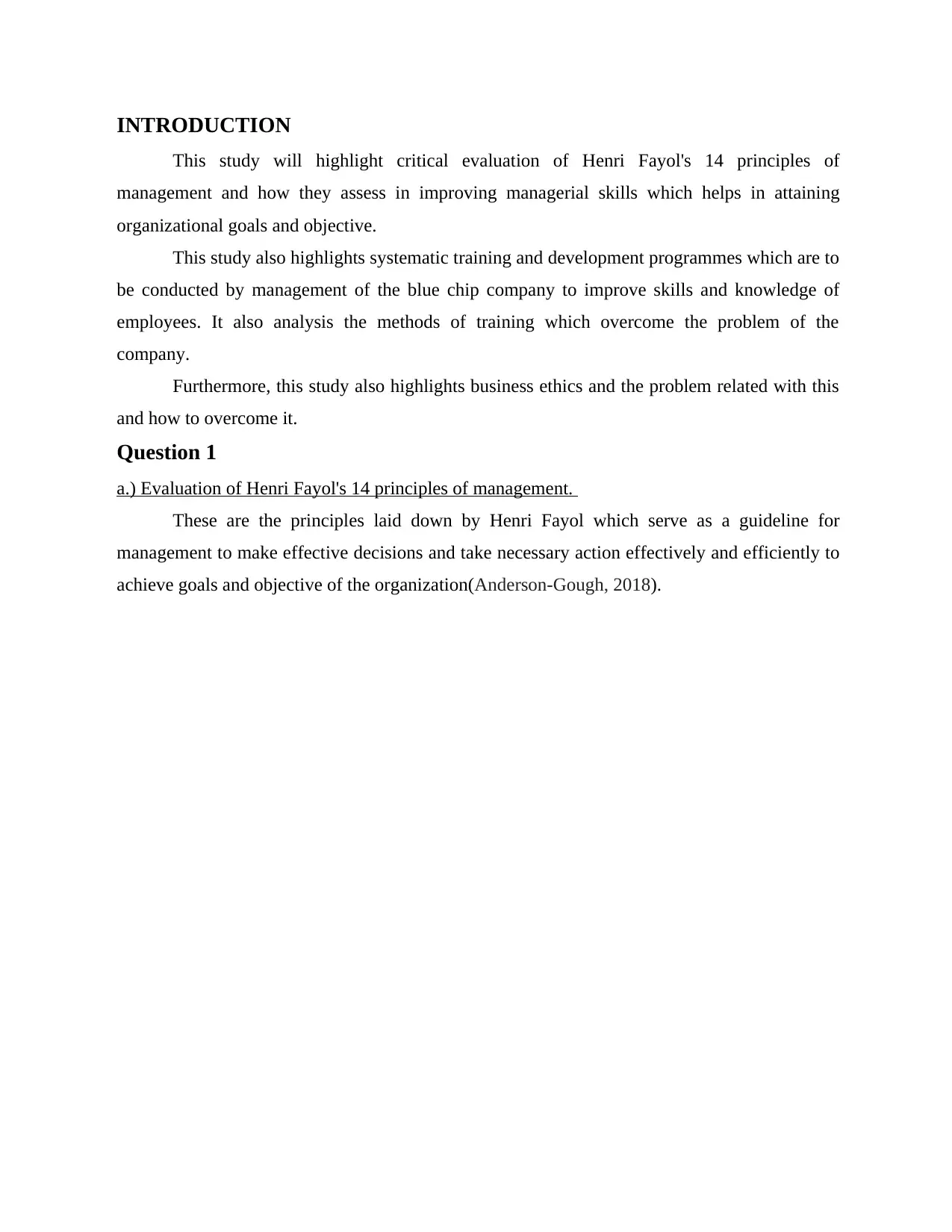
INTRODUCTION
This study will highlight critical evaluation of Henri Fayol's 14 principles of
management and how they assess in improving managerial skills which helps in attaining
organizational goals and objective.
This study also highlights systematic training and development programmes which are to
be conducted by management of the blue chip company to improve skills and knowledge of
employees. It also analysis the methods of training which overcome the problem of the
company.
Furthermore, this study also highlights business ethics and the problem related with this
and how to overcome it.
Question 1
a.) Evaluation of Henri Fayol's 14 principles of management.
These are the principles laid down by Henri Fayol which serve as a guideline for
management to make effective decisions and take necessary action effectively and efficiently to
achieve goals and objective of the organization(Anderson-Gough, 2018).
This study will highlight critical evaluation of Henri Fayol's 14 principles of
management and how they assess in improving managerial skills which helps in attaining
organizational goals and objective.
This study also highlights systematic training and development programmes which are to
be conducted by management of the blue chip company to improve skills and knowledge of
employees. It also analysis the methods of training which overcome the problem of the
company.
Furthermore, this study also highlights business ethics and the problem related with this
and how to overcome it.
Question 1
a.) Evaluation of Henri Fayol's 14 principles of management.
These are the principles laid down by Henri Fayol which serve as a guideline for
management to make effective decisions and take necessary action effectively and efficiently to
achieve goals and objective of the organization(Anderson-Gough, 2018).
⊘ This is a preview!⊘
Do you want full access?
Subscribe today to unlock all pages.

Trusted by 1+ million students worldwide
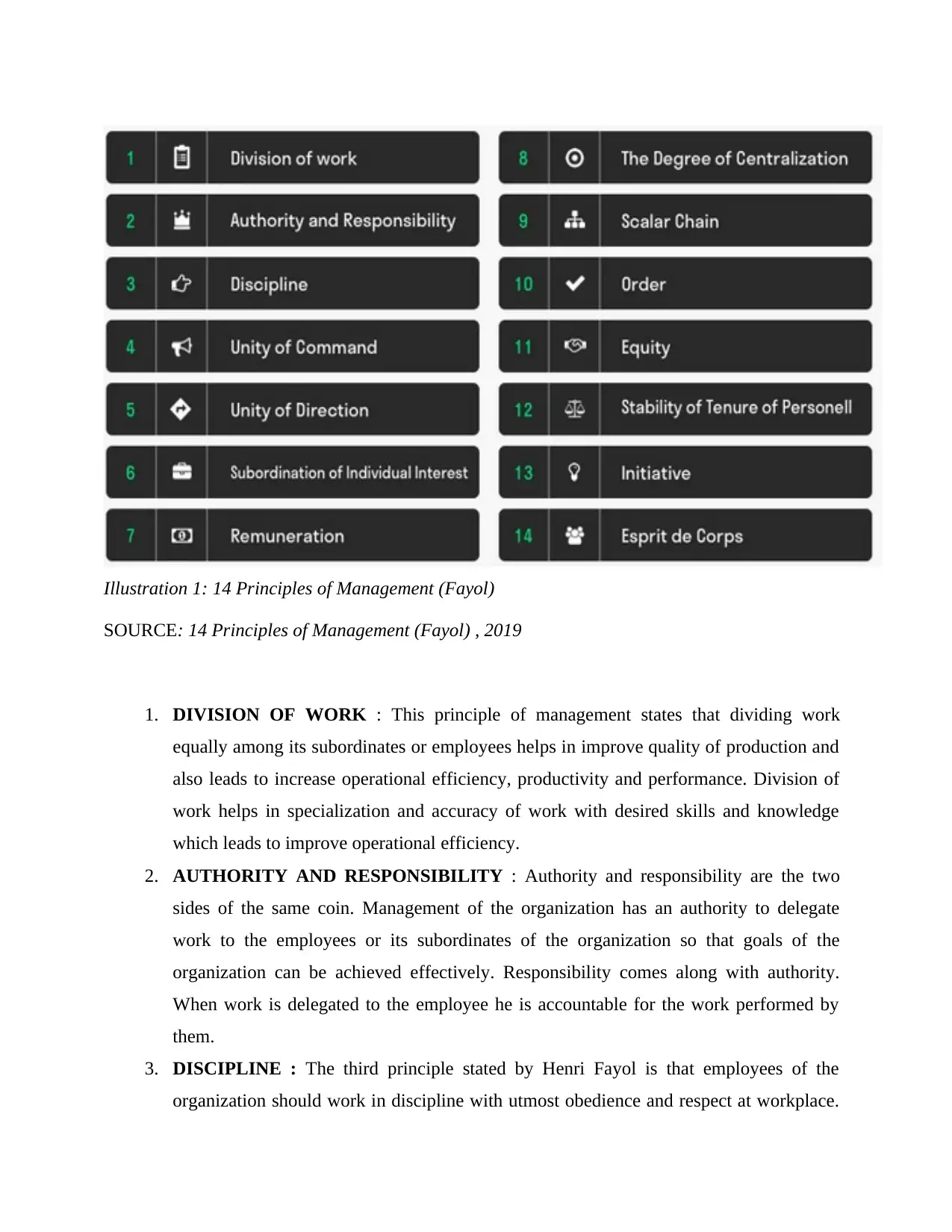
1. DIVISION OF WORK : This principle of management states that dividing work
equally among its subordinates or employees helps in improve quality of production and
also leads to increase operational efficiency, productivity and performance. Division of
work helps in specialization and accuracy of work with desired skills and knowledge
which leads to improve operational efficiency.
2. AUTHORITY AND RESPONSIBILITY : Authority and responsibility are the two
sides of the same coin. Management of the organization has an authority to delegate
work to the employees or its subordinates of the organization so that goals of the
organization can be achieved effectively. Responsibility comes along with authority.
When work is delegated to the employee he is accountable for the work performed by
them.
3. DISCIPLINE : The third principle stated by Henri Fayol is that employees of the
organization should work in discipline with utmost obedience and respect at workplace.
Illustration 1: 14 Principles of Management (Fayol)
SOURCE: 14 Principles of Management (Fayol) , 2019
equally among its subordinates or employees helps in improve quality of production and
also leads to increase operational efficiency, productivity and performance. Division of
work helps in specialization and accuracy of work with desired skills and knowledge
which leads to improve operational efficiency.
2. AUTHORITY AND RESPONSIBILITY : Authority and responsibility are the two
sides of the same coin. Management of the organization has an authority to delegate
work to the employees or its subordinates of the organization so that goals of the
organization can be achieved effectively. Responsibility comes along with authority.
When work is delegated to the employee he is accountable for the work performed by
them.
3. DISCIPLINE : The third principle stated by Henri Fayol is that employees of the
organization should work in discipline with utmost obedience and respect at workplace.
Illustration 1: 14 Principles of Management (Fayol)
SOURCE: 14 Principles of Management (Fayol) , 2019
Paraphrase This Document
Need a fresh take? Get an instant paraphrase of this document with our AI Paraphraser
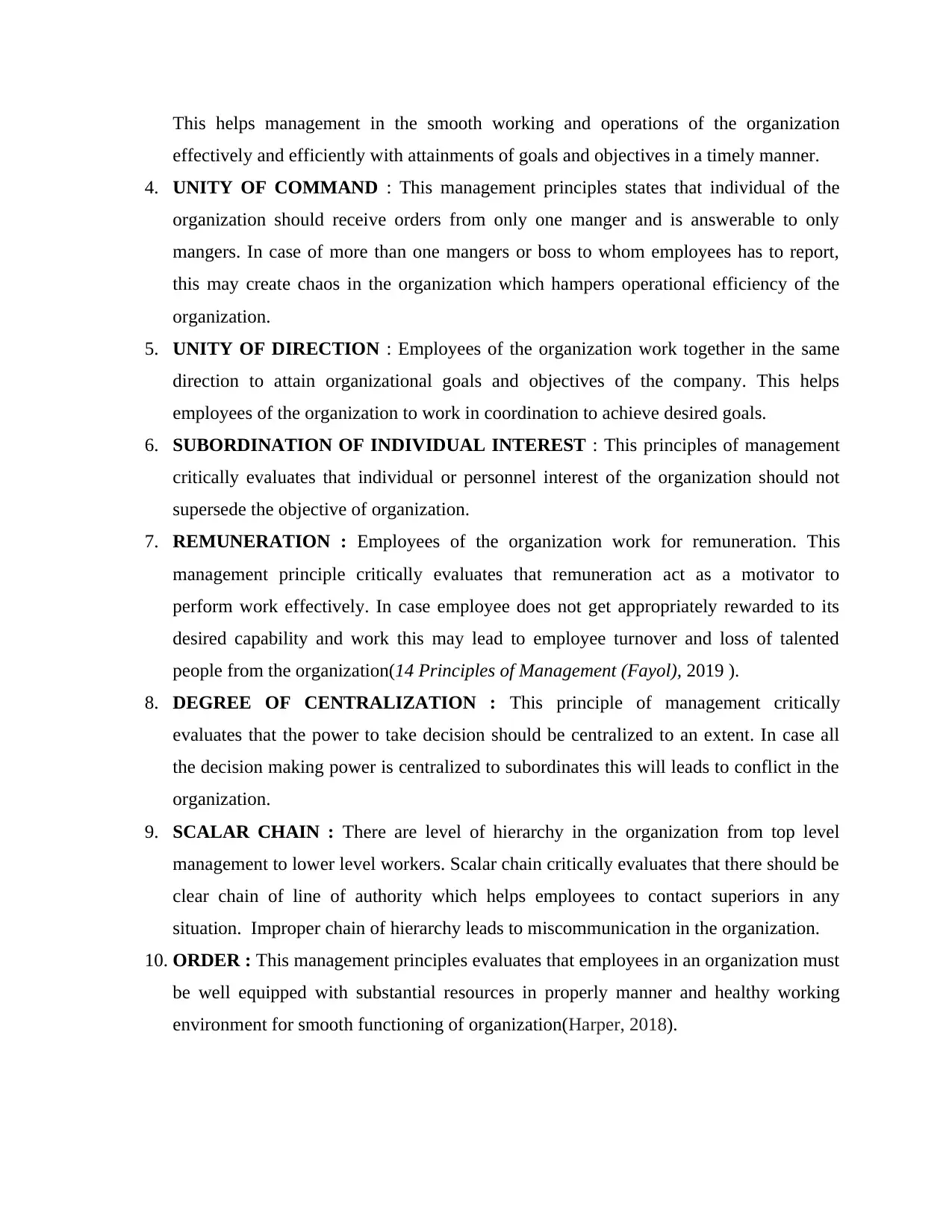
This helps management in the smooth working and operations of the organization
effectively and efficiently with attainments of goals and objectives in a timely manner.
4. UNITY OF COMMAND : This management principles states that individual of the
organization should receive orders from only one manger and is answerable to only
mangers. In case of more than one mangers or boss to whom employees has to report,
this may create chaos in the organization which hampers operational efficiency of the
organization.
5. UNITY OF DIRECTION : Employees of the organization work together in the same
direction to attain organizational goals and objectives of the company. This helps
employees of the organization to work in coordination to achieve desired goals.
6. SUBORDINATION OF INDIVIDUAL INTEREST : This principles of management
critically evaluates that individual or personnel interest of the organization should not
supersede the objective of organization.
7. REMUNERATION : Employees of the organization work for remuneration. This
management principle critically evaluates that remuneration act as a motivator to
perform work effectively. In case employee does not get appropriately rewarded to its
desired capability and work this may lead to employee turnover and loss of talented
people from the organization(14 Principles of Management (Fayol), 2019 ).
8. DEGREE OF CENTRALIZATION : This principle of management critically
evaluates that the power to take decision should be centralized to an extent. In case all
the decision making power is centralized to subordinates this will leads to conflict in the
organization.
9. SCALAR CHAIN : There are level of hierarchy in the organization from top level
management to lower level workers. Scalar chain critically evaluates that there should be
clear chain of line of authority which helps employees to contact superiors in any
situation. Improper chain of hierarchy leads to miscommunication in the organization.
10. ORDER : This management principles evaluates that employees in an organization must
be well equipped with substantial resources in properly manner and healthy working
environment for smooth functioning of organization(Harper, 2018).
effectively and efficiently with attainments of goals and objectives in a timely manner.
4. UNITY OF COMMAND : This management principles states that individual of the
organization should receive orders from only one manger and is answerable to only
mangers. In case of more than one mangers or boss to whom employees has to report,
this may create chaos in the organization which hampers operational efficiency of the
organization.
5. UNITY OF DIRECTION : Employees of the organization work together in the same
direction to attain organizational goals and objectives of the company. This helps
employees of the organization to work in coordination to achieve desired goals.
6. SUBORDINATION OF INDIVIDUAL INTEREST : This principles of management
critically evaluates that individual or personnel interest of the organization should not
supersede the objective of organization.
7. REMUNERATION : Employees of the organization work for remuneration. This
management principle critically evaluates that remuneration act as a motivator to
perform work effectively. In case employee does not get appropriately rewarded to its
desired capability and work this may lead to employee turnover and loss of talented
people from the organization(14 Principles of Management (Fayol), 2019 ).
8. DEGREE OF CENTRALIZATION : This principle of management critically
evaluates that the power to take decision should be centralized to an extent. In case all
the decision making power is centralized to subordinates this will leads to conflict in the
organization.
9. SCALAR CHAIN : There are level of hierarchy in the organization from top level
management to lower level workers. Scalar chain critically evaluates that there should be
clear chain of line of authority which helps employees to contact superiors in any
situation. Improper chain of hierarchy leads to miscommunication in the organization.
10. ORDER : This management principles evaluates that employees in an organization must
be well equipped with substantial resources in properly manner and healthy working
environment for smooth functioning of organization(Harper, 2018).
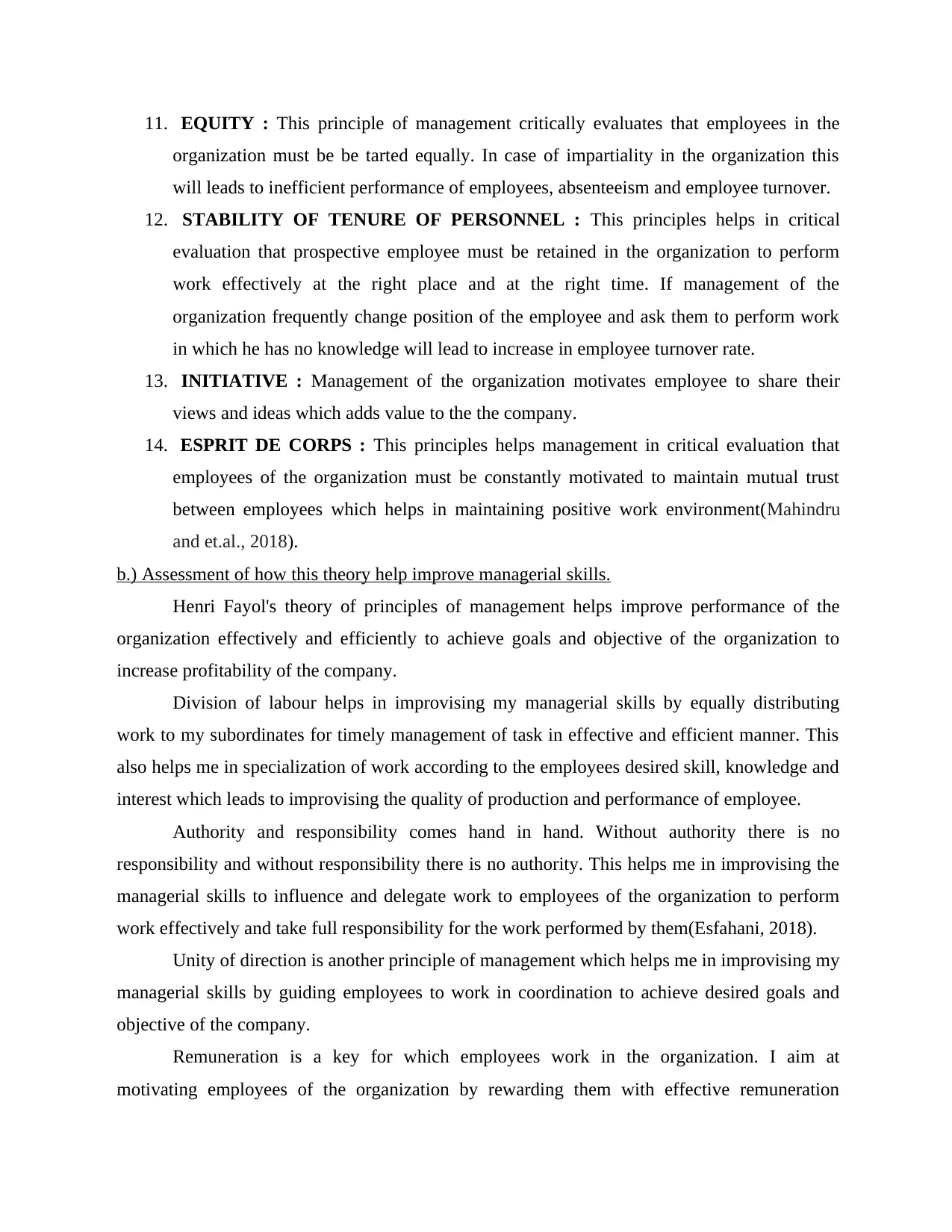
11. EQUITY : This principle of management critically evaluates that employees in the
organization must be be tarted equally. In case of impartiality in the organization this
will leads to inefficient performance of employees, absenteeism and employee turnover.
12. STABILITY OF TENURE OF PERSONNEL : This principles helps in critical
evaluation that prospective employee must be retained in the organization to perform
work effectively at the right place and at the right time. If management of the
organization frequently change position of the employee and ask them to perform work
in which he has no knowledge will lead to increase in employee turnover rate.
13. INITIATIVE : Management of the organization motivates employee to share their
views and ideas which adds value to the the company.
14. ESPRIT DE CORPS : This principles helps management in critical evaluation that
employees of the organization must be constantly motivated to maintain mutual trust
between employees which helps in maintaining positive work environment(Mahindru
and et.al., 2018).
b.) Assessment of how this theory help improve managerial skills.
Henri Fayol's theory of principles of management helps improve performance of the
organization effectively and efficiently to achieve goals and objective of the organization to
increase profitability of the company.
Division of labour helps in improvising my managerial skills by equally distributing
work to my subordinates for timely management of task in effective and efficient manner. This
also helps me in specialization of work according to the employees desired skill, knowledge and
interest which leads to improvising the quality of production and performance of employee.
Authority and responsibility comes hand in hand. Without authority there is no
responsibility and without responsibility there is no authority. This helps me in improvising the
managerial skills to influence and delegate work to employees of the organization to perform
work effectively and take full responsibility for the work performed by them(Esfahani, 2018).
Unity of direction is another principle of management which helps me in improvising my
managerial skills by guiding employees to work in coordination to achieve desired goals and
objective of the company.
Remuneration is a key for which employees work in the organization. I aim at
motivating employees of the organization by rewarding them with effective remuneration
organization must be be tarted equally. In case of impartiality in the organization this
will leads to inefficient performance of employees, absenteeism and employee turnover.
12. STABILITY OF TENURE OF PERSONNEL : This principles helps in critical
evaluation that prospective employee must be retained in the organization to perform
work effectively at the right place and at the right time. If management of the
organization frequently change position of the employee and ask them to perform work
in which he has no knowledge will lead to increase in employee turnover rate.
13. INITIATIVE : Management of the organization motivates employee to share their
views and ideas which adds value to the the company.
14. ESPRIT DE CORPS : This principles helps management in critical evaluation that
employees of the organization must be constantly motivated to maintain mutual trust
between employees which helps in maintaining positive work environment(Mahindru
and et.al., 2018).
b.) Assessment of how this theory help improve managerial skills.
Henri Fayol's theory of principles of management helps improve performance of the
organization effectively and efficiently to achieve goals and objective of the organization to
increase profitability of the company.
Division of labour helps in improvising my managerial skills by equally distributing
work to my subordinates for timely management of task in effective and efficient manner. This
also helps me in specialization of work according to the employees desired skill, knowledge and
interest which leads to improvising the quality of production and performance of employee.
Authority and responsibility comes hand in hand. Without authority there is no
responsibility and without responsibility there is no authority. This helps me in improvising the
managerial skills to influence and delegate work to employees of the organization to perform
work effectively and take full responsibility for the work performed by them(Esfahani, 2018).
Unity of direction is another principle of management which helps me in improvising my
managerial skills by guiding employees to work in coordination to achieve desired goals and
objective of the company.
Remuneration is a key for which employees work in the organization. I aim at
motivating employees of the organization by rewarding them with effective remuneration
⊘ This is a preview!⊘
Do you want full access?
Subscribe today to unlock all pages.

Trusted by 1+ million students worldwide
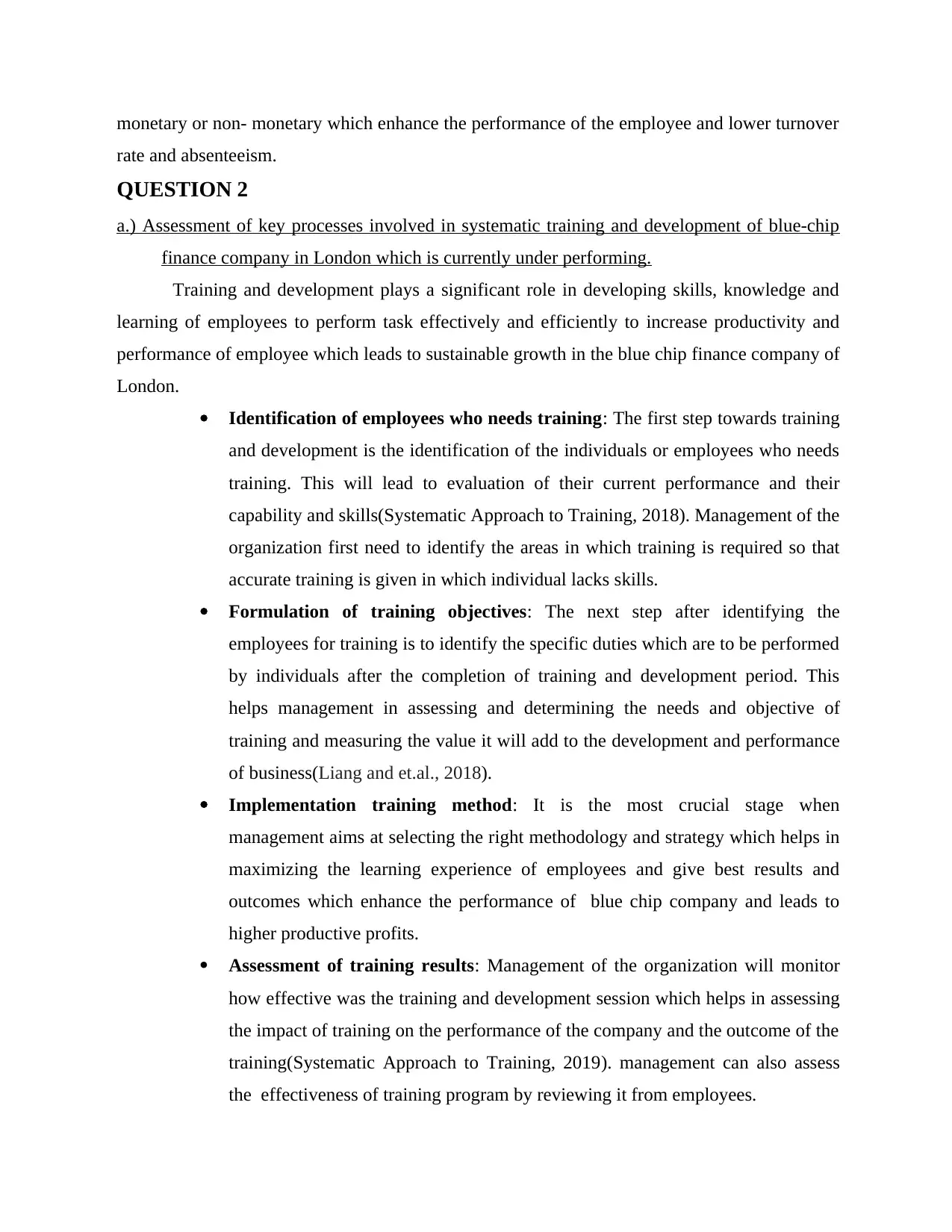
monetary or non- monetary which enhance the performance of the employee and lower turnover
rate and absenteeism.
QUESTION 2
a.) Assessment of key processes involved in systematic training and development of blue-chip
finance company in London which is currently under performing.
Training and development plays a significant role in developing skills, knowledge and
learning of employees to perform task effectively and efficiently to increase productivity and
performance of employee which leads to sustainable growth in the blue chip finance company of
London.
Identification of employees who needs training: The first step towards training
and development is the identification of the individuals or employees who needs
training. This will lead to evaluation of their current performance and their
capability and skills(Systematic Approach to Training, 2018). Management of the
organization first need to identify the areas in which training is required so that
accurate training is given in which individual lacks skills.
Formulation of training objectives: The next step after identifying the
employees for training is to identify the specific duties which are to be performed
by individuals after the completion of training and development period. This
helps management in assessing and determining the needs and objective of
training and measuring the value it will add to the development and performance
of business(Liang and et.al., 2018).
Implementation training method: It is the most crucial stage when
management aims at selecting the right methodology and strategy which helps in
maximizing the learning experience of employees and give best results and
outcomes which enhance the performance of blue chip company and leads to
higher productive profits.
Assessment of training results: Management of the organization will monitor
how effective was the training and development session which helps in assessing
the impact of training on the performance of the company and the outcome of the
training(Systematic Approach to Training, 2019). management can also assess
the effectiveness of training program by reviewing it from employees.
rate and absenteeism.
QUESTION 2
a.) Assessment of key processes involved in systematic training and development of blue-chip
finance company in London which is currently under performing.
Training and development plays a significant role in developing skills, knowledge and
learning of employees to perform task effectively and efficiently to increase productivity and
performance of employee which leads to sustainable growth in the blue chip finance company of
London.
Identification of employees who needs training: The first step towards training
and development is the identification of the individuals or employees who needs
training. This will lead to evaluation of their current performance and their
capability and skills(Systematic Approach to Training, 2018). Management of the
organization first need to identify the areas in which training is required so that
accurate training is given in which individual lacks skills.
Formulation of training objectives: The next step after identifying the
employees for training is to identify the specific duties which are to be performed
by individuals after the completion of training and development period. This
helps management in assessing and determining the needs and objective of
training and measuring the value it will add to the development and performance
of business(Liang and et.al., 2018).
Implementation training method: It is the most crucial stage when
management aims at selecting the right methodology and strategy which helps in
maximizing the learning experience of employees and give best results and
outcomes which enhance the performance of blue chip company and leads to
higher productive profits.
Assessment of training results: Management of the organization will monitor
how effective was the training and development session which helps in assessing
the impact of training on the performance of the company and the outcome of the
training(Systematic Approach to Training, 2019). management can also assess
the effectiveness of training program by reviewing it from employees.
Paraphrase This Document
Need a fresh take? Get an instant paraphrase of this document with our AI Paraphraser
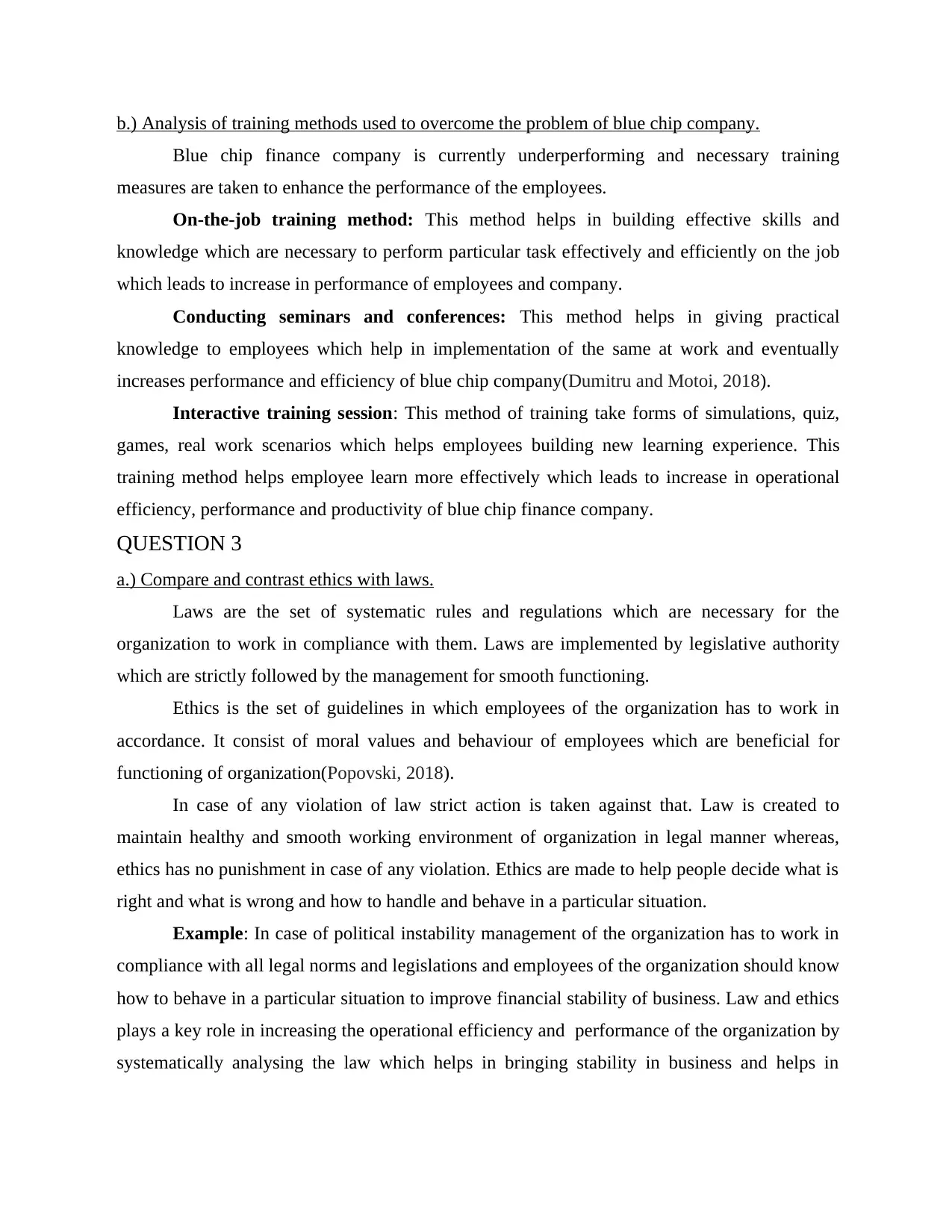
b.) Analysis of training methods used to overcome the problem of blue chip company.
Blue chip finance company is currently underperforming and necessary training
measures are taken to enhance the performance of the employees.
On-the-job training method: This method helps in building effective skills and
knowledge which are necessary to perform particular task effectively and efficiently on the job
which leads to increase in performance of employees and company.
Conducting seminars and conferences: This method helps in giving practical
knowledge to employees which help in implementation of the same at work and eventually
increases performance and efficiency of blue chip company(Dumitru and Motoi, 2018).
Interactive training session: This method of training take forms of simulations, quiz,
games, real work scenarios which helps employees building new learning experience. This
training method helps employee learn more effectively which leads to increase in operational
efficiency, performance and productivity of blue chip finance company.
QUESTION 3
a.) Compare and contrast ethics with laws.
Laws are the set of systematic rules and regulations which are necessary for the
organization to work in compliance with them. Laws are implemented by legislative authority
which are strictly followed by the management for smooth functioning.
Ethics is the set of guidelines in which employees of the organization has to work in
accordance. It consist of moral values and behaviour of employees which are beneficial for
functioning of organization(Popovski, 2018).
In case of any violation of law strict action is taken against that. Law is created to
maintain healthy and smooth working environment of organization in legal manner whereas,
ethics has no punishment in case of any violation. Ethics are made to help people decide what is
right and what is wrong and how to handle and behave in a particular situation.
Example: In case of political instability management of the organization has to work in
compliance with all legal norms and legislations and employees of the organization should know
how to behave in a particular situation to improve financial stability of business. Law and ethics
plays a key role in increasing the operational efficiency and performance of the organization by
systematically analysing the law which helps in bringing stability in business and helps in
Blue chip finance company is currently underperforming and necessary training
measures are taken to enhance the performance of the employees.
On-the-job training method: This method helps in building effective skills and
knowledge which are necessary to perform particular task effectively and efficiently on the job
which leads to increase in performance of employees and company.
Conducting seminars and conferences: This method helps in giving practical
knowledge to employees which help in implementation of the same at work and eventually
increases performance and efficiency of blue chip company(Dumitru and Motoi, 2018).
Interactive training session: This method of training take forms of simulations, quiz,
games, real work scenarios which helps employees building new learning experience. This
training method helps employee learn more effectively which leads to increase in operational
efficiency, performance and productivity of blue chip finance company.
QUESTION 3
a.) Compare and contrast ethics with laws.
Laws are the set of systematic rules and regulations which are necessary for the
organization to work in compliance with them. Laws are implemented by legislative authority
which are strictly followed by the management for smooth functioning.
Ethics is the set of guidelines in which employees of the organization has to work in
accordance. It consist of moral values and behaviour of employees which are beneficial for
functioning of organization(Popovski, 2018).
In case of any violation of law strict action is taken against that. Law is created to
maintain healthy and smooth working environment of organization in legal manner whereas,
ethics has no punishment in case of any violation. Ethics are made to help people decide what is
right and what is wrong and how to handle and behave in a particular situation.
Example: In case of political instability management of the organization has to work in
compliance with all legal norms and legislations and employees of the organization should know
how to behave in a particular situation to improve financial stability of business. Law and ethics
plays a key role in increasing the operational efficiency and performance of the organization by
systematically analysing the law which helps in bringing stability in business and helps in
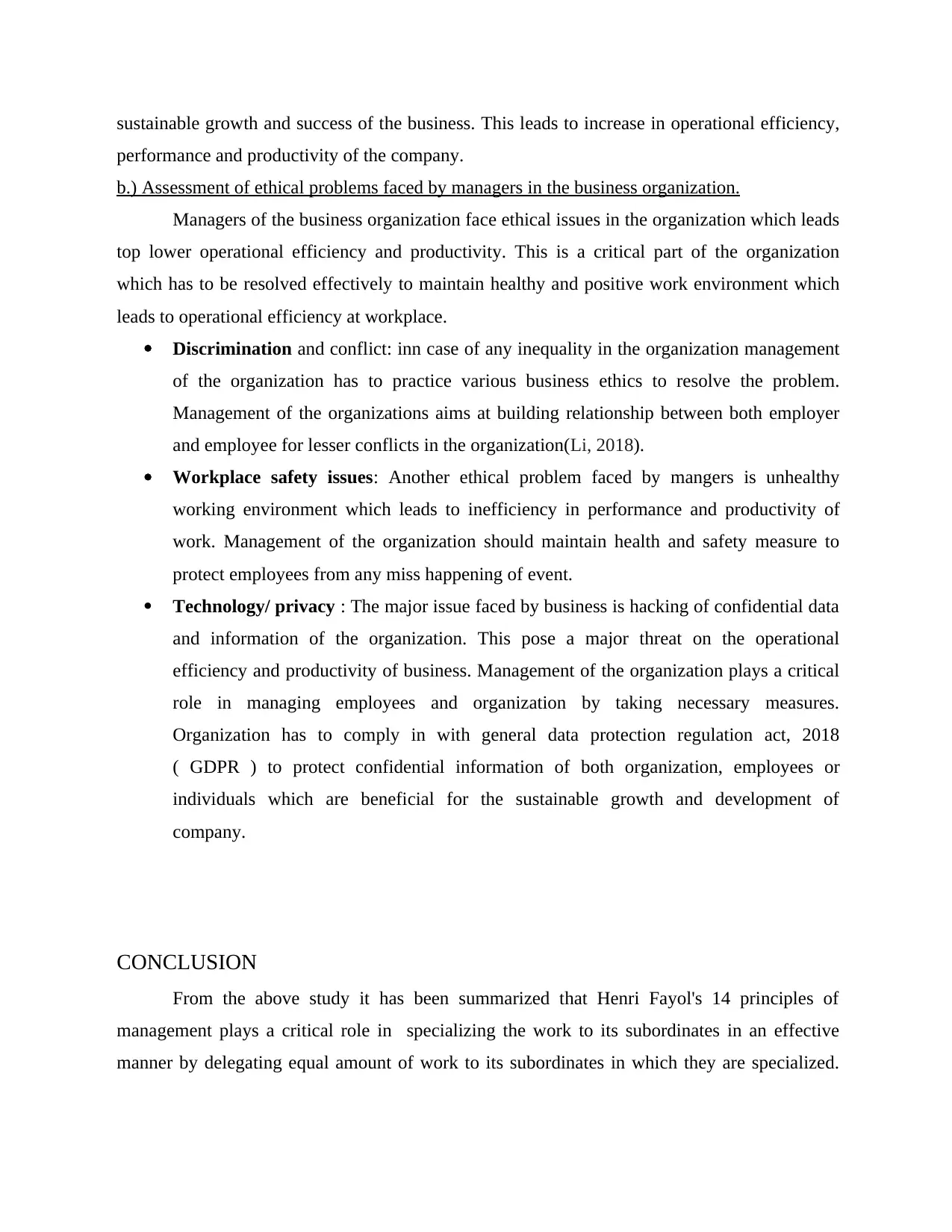
sustainable growth and success of the business. This leads to increase in operational efficiency,
performance and productivity of the company.
b.) Assessment of ethical problems faced by managers in the business organization.
Managers of the business organization face ethical issues in the organization which leads
top lower operational efficiency and productivity. This is a critical part of the organization
which has to be resolved effectively to maintain healthy and positive work environment which
leads to operational efficiency at workplace.
Discrimination and conflict: inn case of any inequality in the organization management
of the organization has to practice various business ethics to resolve the problem.
Management of the organizations aims at building relationship between both employer
and employee for lesser conflicts in the organization(Li, 2018).
Workplace safety issues: Another ethical problem faced by mangers is unhealthy
working environment which leads to inefficiency in performance and productivity of
work. Management of the organization should maintain health and safety measure to
protect employees from any miss happening of event.
Technology/ privacy : The major issue faced by business is hacking of confidential data
and information of the organization. This pose a major threat on the operational
efficiency and productivity of business. Management of the organization plays a critical
role in managing employees and organization by taking necessary measures.
Organization has to comply in with general data protection regulation act, 2018
( GDPR ) to protect confidential information of both organization, employees or
individuals which are beneficial for the sustainable growth and development of
company.
CONCLUSION
From the above study it has been summarized that Henri Fayol's 14 principles of
management plays a critical role in specializing the work to its subordinates in an effective
manner by delegating equal amount of work to its subordinates in which they are specialized.
performance and productivity of the company.
b.) Assessment of ethical problems faced by managers in the business organization.
Managers of the business organization face ethical issues in the organization which leads
top lower operational efficiency and productivity. This is a critical part of the organization
which has to be resolved effectively to maintain healthy and positive work environment which
leads to operational efficiency at workplace.
Discrimination and conflict: inn case of any inequality in the organization management
of the organization has to practice various business ethics to resolve the problem.
Management of the organizations aims at building relationship between both employer
and employee for lesser conflicts in the organization(Li, 2018).
Workplace safety issues: Another ethical problem faced by mangers is unhealthy
working environment which leads to inefficiency in performance and productivity of
work. Management of the organization should maintain health and safety measure to
protect employees from any miss happening of event.
Technology/ privacy : The major issue faced by business is hacking of confidential data
and information of the organization. This pose a major threat on the operational
efficiency and productivity of business. Management of the organization plays a critical
role in managing employees and organization by taking necessary measures.
Organization has to comply in with general data protection regulation act, 2018
( GDPR ) to protect confidential information of both organization, employees or
individuals which are beneficial for the sustainable growth and development of
company.
CONCLUSION
From the above study it has been summarized that Henri Fayol's 14 principles of
management plays a critical role in specializing the work to its subordinates in an effective
manner by delegating equal amount of work to its subordinates in which they are specialized.
⊘ This is a preview!⊘
Do you want full access?
Subscribe today to unlock all pages.

Trusted by 1+ million students worldwide
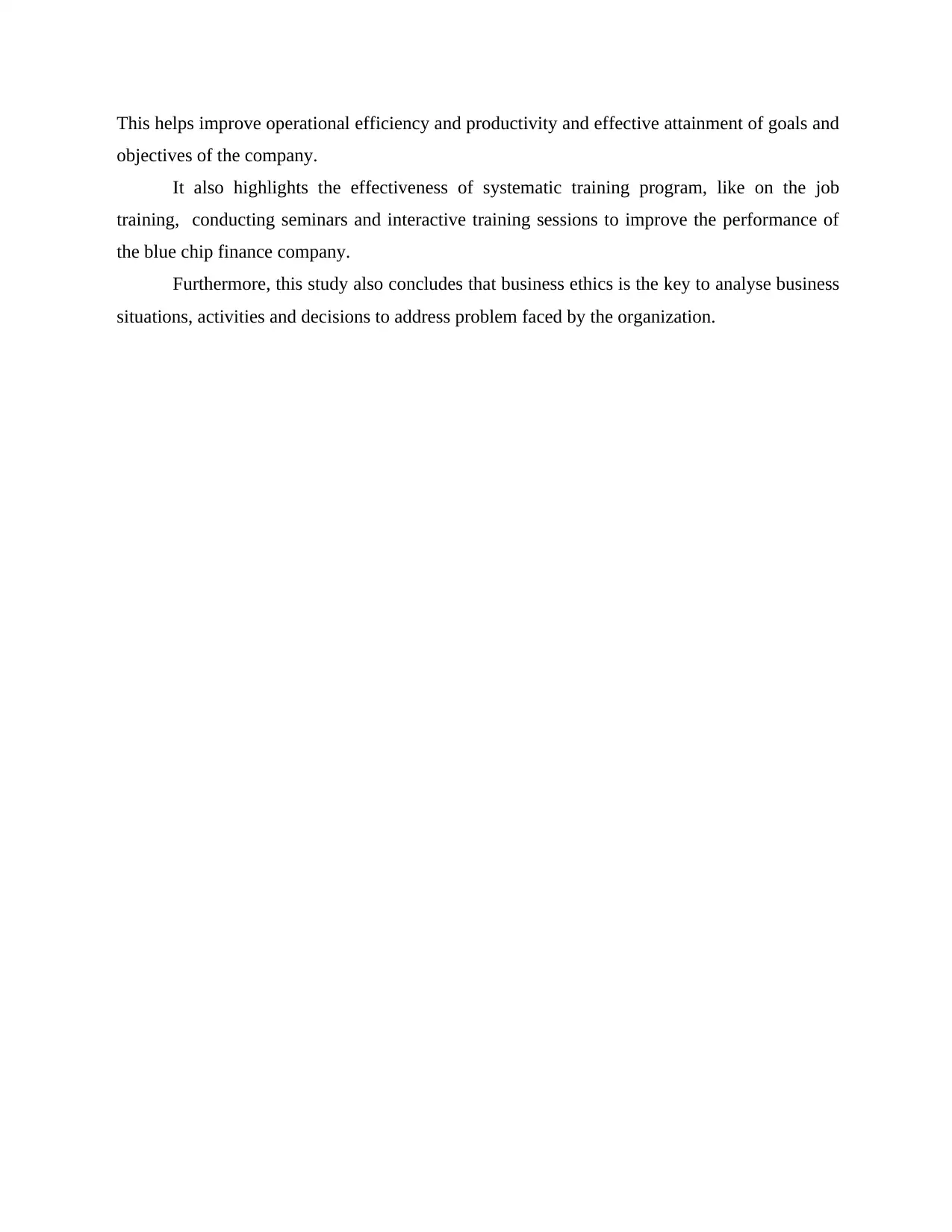
This helps improve operational efficiency and productivity and effective attainment of goals and
objectives of the company.
It also highlights the effectiveness of systematic training program, like on the job
training, conducting seminars and interactive training sessions to improve the performance of
the blue chip finance company.
Furthermore, this study also concludes that business ethics is the key to analyse business
situations, activities and decisions to address problem faced by the organization.
objectives of the company.
It also highlights the effectiveness of systematic training program, like on the job
training, conducting seminars and interactive training sessions to improve the performance of
the blue chip finance company.
Furthermore, this study also concludes that business ethics is the key to analyse business
situations, activities and decisions to address problem faced by the organization.
Paraphrase This Document
Need a fresh take? Get an instant paraphrase of this document with our AI Paraphraser
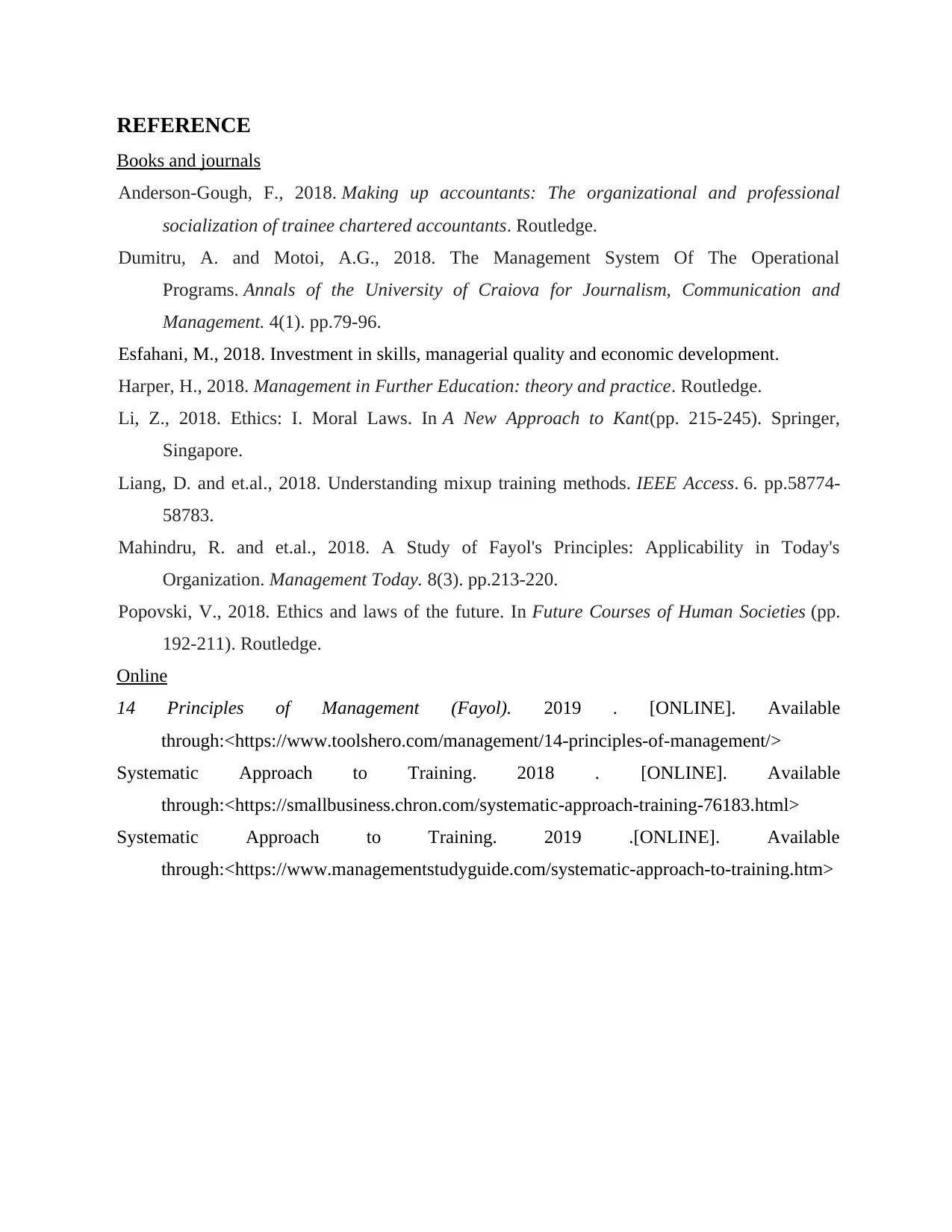
REFERENCE
Books and journals
Anderson-Gough, F., 2018. Making up accountants: The organizational and professional
socialization of trainee chartered accountants. Routledge.
Dumitru, A. and Motoi, A.G., 2018. The Management System Of The Operational
Programs. Annals of the University of Craiova for Journalism, Communication and
Management. 4(1). pp.79-96.
Esfahani, M., 2018. Investment in skills, managerial quality and economic development.
Harper, H., 2018. Management in Further Education: theory and practice. Routledge.
Li, Z., 2018. Ethics: I. Moral Laws. In A New Approach to Kant(pp. 215-245). Springer,
Singapore.
Liang, D. and et.al., 2018. Understanding mixup training methods. IEEE Access. 6. pp.58774-
58783.
Mahindru, R. and et.al., 2018. A Study of Fayol's Principles: Applicability in Today's
Organization. Management Today. 8(3). pp.213-220.
Popovski, V., 2018. Ethics and laws of the future. In Future Courses of Human Societies (pp.
192-211). Routledge.
Online
14 Principles of Management (Fayol). 2019 . [ONLINE]. Available
through:<https://www.toolshero.com/management/14-principles-of-management/>
Systematic Approach to Training. 2018 . [ONLINE]. Available
through:<https://smallbusiness.chron.com/systematic-approach-training-76183.html>
Systematic Approach to Training. 2019 .[ONLINE]. Available
through:<https://www.managementstudyguide.com/systematic-approach-to-training.htm>
Books and journals
Anderson-Gough, F., 2018. Making up accountants: The organizational and professional
socialization of trainee chartered accountants. Routledge.
Dumitru, A. and Motoi, A.G., 2018. The Management System Of The Operational
Programs. Annals of the University of Craiova for Journalism, Communication and
Management. 4(1). pp.79-96.
Esfahani, M., 2018. Investment in skills, managerial quality and economic development.
Harper, H., 2018. Management in Further Education: theory and practice. Routledge.
Li, Z., 2018. Ethics: I. Moral Laws. In A New Approach to Kant(pp. 215-245). Springer,
Singapore.
Liang, D. and et.al., 2018. Understanding mixup training methods. IEEE Access. 6. pp.58774-
58783.
Mahindru, R. and et.al., 2018. A Study of Fayol's Principles: Applicability in Today's
Organization. Management Today. 8(3). pp.213-220.
Popovski, V., 2018. Ethics and laws of the future. In Future Courses of Human Societies (pp.
192-211). Routledge.
Online
14 Principles of Management (Fayol). 2019 . [ONLINE]. Available
through:<https://www.toolshero.com/management/14-principles-of-management/>
Systematic Approach to Training. 2018 . [ONLINE]. Available
through:<https://smallbusiness.chron.com/systematic-approach-training-76183.html>
Systematic Approach to Training. 2019 .[ONLINE]. Available
through:<https://www.managementstudyguide.com/systematic-approach-to-training.htm>
1 out of 11
Related Documents
Your All-in-One AI-Powered Toolkit for Academic Success.
+13062052269
info@desklib.com
Available 24*7 on WhatsApp / Email
![[object Object]](/_next/static/media/star-bottom.7253800d.svg)
Unlock your academic potential
Copyright © 2020–2026 A2Z Services. All Rights Reserved. Developed and managed by ZUCOL.





